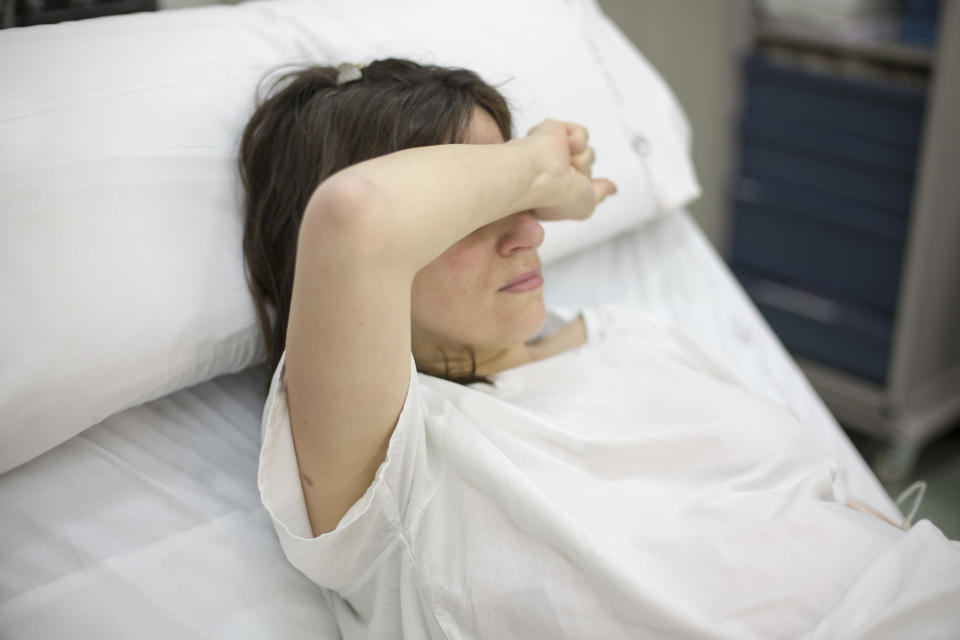Pregnant during the coronavirus outbreak: 'I'm urging the government not to ban birth partners'

When Emma Payne was told that when she gives birth, in the next few weeks, she will only be able to have her husband with her once she is in established labour, she broke down in tears.
The call handler for NHS 111 is currently 34 weeks pregnant with her second daughter and due to give birth in the middle of the coronavirus pandemic.
As such she’s witnessed changes to her pregnancy care which has seen her attending antenatal appointments alone, and now she’s facing the very real prospect that she may also have to delivery her baby alone too.
Like Emma, many pregnant women have been asked by their health authorities to attend antenatal appointments alone, and in certain hospitals birth partners will no longer be able to visit antenatal and postnatal wards in bid to protect mothers and newborn babies from the spread of coronavirus.
While understanding the need for extra protection, parents-to-be are now left wondering if the measures could go further still by banning birth partners entirely.
Latest coronavirus news, updates and advice
Live: Follow all the latest updates from the UK and around the world
Fact-checker: The number of COVID-19 cases in your local area
Explained: Symptoms, latest advice and how it compares to the flu
It was being told by her midwife that she should prepare herself for the prospect of potentially giving birth alone that prompted Emma to set up a Change.org petition urging against birthing measures becoming more strict, which could see women giving birth without support.
Emma had been admitted to hospital, alone, for a suspected pulmonary embolism and while there she learnt pregnant women, like her, would not be permitted to have their birthing partner with them until they are in established labour.
She was also told the measures may increase over the coming weeks, meaning pregnant women could have no birthing partner for the entire duration of the labour and birth.
“It was that news that prompted me to set up the petition,” she tells Yahoo UK. “I couldn’t cope with the prospect of it, I was just terrified.”
“I woke up the next morning feeling really angry about the situation. I thought if this is affecting me and I’ve already been through it, first time mums must be going through absolute hell.
“I just wanted to bring some attention for what was going on.”

Working for the NHS herself, Emma completely understands the need for measures to adapt in order to protect the safety of pregnant women and their babies, but she also realises that this uncertainty about potentially having to give birth alone is causing confusion and anxiety.
“I understand to a certain degree, they need to keep the wards safe and clean and protect the staff running and they are worried that people might be bringing the virus into the hospital.
“My argument, however, is me and my husband are both self-isolating and from the same household. If he has got the virus, it is more than likely I will also have it. So if they are dealing with me I don’t understand how him being there too is increasing the risk.
“And if they are allowed into the last stage of the labour, he’s going to be there anyway so what is the difference if he is only allowed in for an hour or ten hours?”
Emma believes that while the focus is, quite rightly, on the potential effects of coronavirus, other impacts of giving birth alone could be overlooked.
“I don’t know if they’re giving enough consideration to the repercussions of stripping women of their rights of having a birthing partner,” she explains.
“I predict there will be a rise in post-natal depression,” she adds.
“And potentially more complications during birth.”
Emma says her husband played an important role in the delivery of the couple’s first daughter in 2017.
“With my daughter I had to be induced and didn’t reached the established labour stage for 30 hours,” she explains.
“He was there during the entire 30 hour labour,” she explains. “I didn’t take very well to the medication they induced me with. I got really exhausted and I wasn’t having a break between contractions, it made me incoherent I wasn’t able to have a conversation, the midwives were asking me if I wanted pain relief and I couldn’t answer because I didn’t know what I was being told.
“I wasn’t able to get up and walk about, to get myself any fluids because I was in so much pain. In the end they had to get the crash team in because they thought I was going to go into cardiac arrest because my heart rate became so accelerated.
“My husband was the one that alerted the midwife to the fact that something wasn’t right and if he hadn’t have been there and I’d have been in a room on my own, potentially I could have gone into cardiac arrest and no one would have known,” she says.
Emma is now concerned that if her husband isn’t allowed to be with her until she’s in established labour that the same thing could happen again, particularly as she can’t see already stretched midwives being able to be present through the entirety of labour.
“The RCM has said they are concerned their midwives are being redeployed, so they have less staff than they would usually have.
“So how are they expected to look after and give appropriate care to every woman if they haven’t got their support partner there with them.
“Surely they should be relying more heavily on the support partner picking up some of the slack that midwives can’t.”
Read more: Pregnancy and birth care is changing because of coronavirus: here's what you need to know

The petition also addresses measures introduced that could see birth partners asked to leave within hours of the baby being born.
“I have been told that dads and other birth partners will need to leave within an hour or two after the birth and then not being allowed back into the hospital unless there are special circumstances, for example if baby had to be admitted to special care,” she says.
“With my first birth I was admitted for seven days and if that happens again I will have no contact with anyone.
“People who have a caesarean will be struggling because they won’t even be able to pick baby up so they will be relying heavily on the midwives, which is going to put more pressure on the staff.
“That isn’t a reflection or criticism on them, they are doing the best they can, but it is a consideration,” she adds.
Emma hopes that the petition, addressed to health secretary Matt Hancock and prime minister, Boris Johnson, will help bring some clarity about the birth measures during the coronavirus pandemic and ease the anxiety of expectant parents.
“Giving birth at the best of times is a stressful situation, but we are doing it in unprecedented times during a pandemic,” she explains.
“And potentially taking our support partner away from us is just adding to the stress.
“Birth partners play a really important role and them being able to join mum when she’s in established labour is just not good enough,” she says.
“They need to be there from the beginning.”
Emma is also hoping the petition could help establish some certainty in terms of differing measures between different hospitals.
“The women that have got in contact with me since the petition launched are all being told various different things, it’s like a post code lottery and it shouldn’t be,” she explains.
“Everyone should be following the same guidance surely?
“If it is left up to the individual hospital’s discretion, this will all add to the confusion and anxiety. And the uncertainty is horrible.”
Since launching the petition it has been signed by 160K people and Emma has been contacted by women thanking her for throwing a light on the subject in an effort to clarify the situation for couples who are expecting.
And petitions can be powerful tools.
Over in the US, reports from New York that some pregnant women would have to give birth without their partners resulted in an outcry from expectant parents, doulas and midwives, and a petition that received more than 600,000 signatures.
As a result it was announced over the weekend that New York will order all hospitals to allow partners in delivery rooms, despite the coronavirus risk.
So it is possible Emma’s petition could see a similar result in the UK.
Gill Walton, Chief Executive of the Royal College of Midwives, told Yahoo UK: “Up and down the country, midwives are doing everything they can to provide safe care and support. They are adapting to the new normal, including moving some appointments online or by phone, and putting the minds of the pregnant women in their care at ease.
“Your safety and that of your baby is always the absolute priority of midwives and maternity support workers. In some cases, the impact of the current crisis may mean that you cannot have the birth you planned.
“We know that this may be difficult, but it is done with your best interests at heart. Keeping services at a single location, like a hospital, means that, at a time when resources are stretched, women continue to get the care and support they need, quickly, safely and effectively.
“We know that maternity services are already feeling the impact of coronavirus, which is why we are calling on the Government to guarantee that they are ring-fenced and that midwives, maternity support workers and other staff are not redeployed away from them. This is crucial to ensure continued safe care for women.”




